For the 2025 school year, there is 1 public preschool serving 314 students in Preston School District. This district's average pre testing ranking is 6/10, which is in the top 50% of public pre schools in Connecticut.
Public Preschool in Preston School District have an average math proficiency score of 47% (versus the Connecticut public pre school average of 35%), and reading proficiency score of 62% (versus the 42% statewide average).
Minority enrollment is 19% of the student body (majority Hispanic), which is less than the Connecticut public preschool average of 59% (majority Hispanic).
Overview
This School District
This State (CT)
# Schools
2 Schools
345 Schools
# Students
444 Students
132,954 Students
# Teachers
33 Teachers
10,546 Teachers
Student : Teacher Ratio
13:1
13:1
District Rank
Preston School District, which is ranked within the bottom 50% of all 197 school districts in Connecticut (based off of combined math and reading proficiency testing data) for the 2021-2022 school year.
Overall District Rank
#115 out of 200 school districts
(Bottom 50%)
(Bottom 50%)
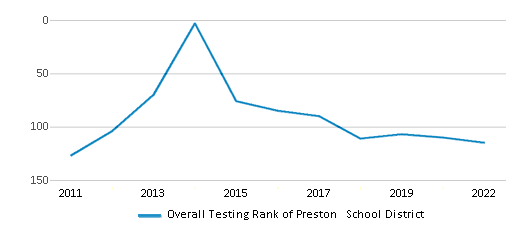
Math Test Scores (% Proficient)
41%
40%
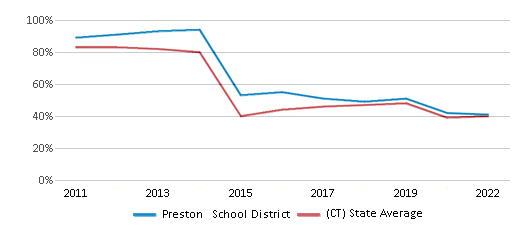
Reading/Language Arts Test Scores (% Proficient)
53%
50%
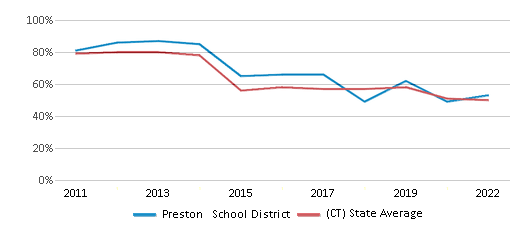
Science Test Scores (% Proficient)
50-54%
47%
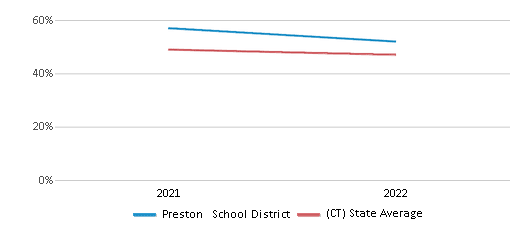
Students by Ethnicity:
Diversity Score
0.34
0.70
# American Indian Students
1 Student
381 Students
% American Indian Students
n/a
n/a
# Asian Students
10 Students
6,332 Students
% Asian Students
2%
5%
# Hispanic Students
43 Students
44,965 Students
% Hispanic Students
10%
34%
# Black Students
8 Students
19,832 Students
% Black Students
2%
15%
# White Students
359 Students
54,707 Students
% White Students
81%
41%
# Hawaiian Students
5 Students
132 Students
% Hawaiian Students
1%
n/a
# Two or more races Students
18 Students
6,568 Students
% of Two or more races Students
4%
5%
Students by Grade:
# Students in PK Grade:
41
14,518
# Students in K Grade:
40
19,819
# Students in 1st Grade:
55
19,906
# Students in 2nd Grade:
50
20,278
# Students in 3rd Grade:
36
15,997
# Students in 4th Grade:
39
16,056
# Students in 5th Grade:
53
13,209
# Students in 6th Grade:
52
5,100
# Students in 7th Grade:
38
3,978
# Students in 8th Grade:
40
3,865
# Students in 9th Grade:
-
67
# Students in 10th Grade:
-
64
# Students in 11th Grade:
-
43
# Students in 12th Grade:
-
54
# Ungraded Students:
-
-
District Revenue and Spending
The revenue/student of $33,561 is higher than the state median of $26,157. The school district revenue/student has declined by 9% over four school years.
The school district's spending/student of $32,836 is higher than the state median of $25,225. The school district spending/student has declined by 9% over four school years.
Total Revenue
$15 MM
$12,920 MM
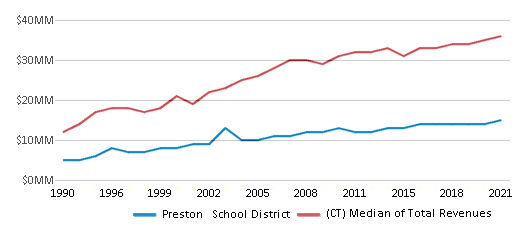
Spending
$15 MM
$12,459 MM
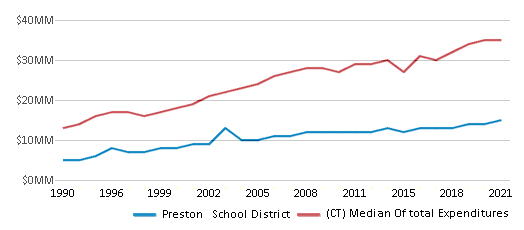
Revenue / Student
$33,561
$26,157
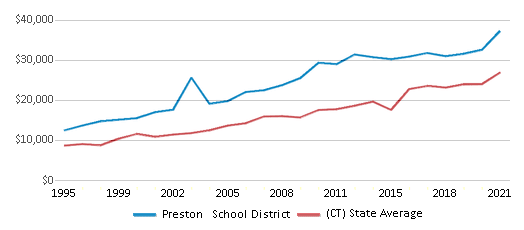
Spending / Student
$32,836
$25,225
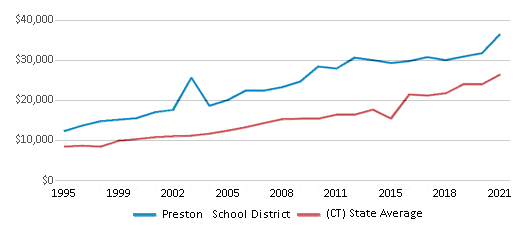
Best Preston School District Public Preschools (2025)
School
(Math and Reading Proficiency)
(Math and Reading Proficiency)
Location
Grades
Students
Rank: #11.
Preston Veterans' Memorial School
(Math: 45-49% | Reading: 60-64%)
Rank:
Rank:
7/
Top 50%10
325 Shetucket Tpke.
Preston, CT 06365
(860) 887-3113
Preston, CT 06365
(860) 887-3113
Grades: PK-5
| 314 students
Recent Articles

What Is A Charter School?
Explore the world of charter schools in this comprehensive guide. Learn about their history, how they operate, and the pros and cons of this educational innovation. Discover key facts about charter schools, including admission policies, demographics, and funding, as well as what to look for when considering a charter school for your child.

10 Reasons Why High School Sports Benefit Students
Discover the 10 compelling reasons why high school sports are beneficial for students. This comprehensive article explores how athletics enhance academic performance, foster personal growth, and develop crucial life skills. From improved fitness and time management to leadership development and community representation, learn why participating in high school sports can be a game-changer for students' overall success and well-being.

February 05, 2025
Understanding the U.S. Department of Education: Structure, Impact, and EvolutionWe explore how the Department of Education shapes American education, from its cabinet-level leadership to its impact on millions of students, written for general audiences seeking clarity on this vital institution.





